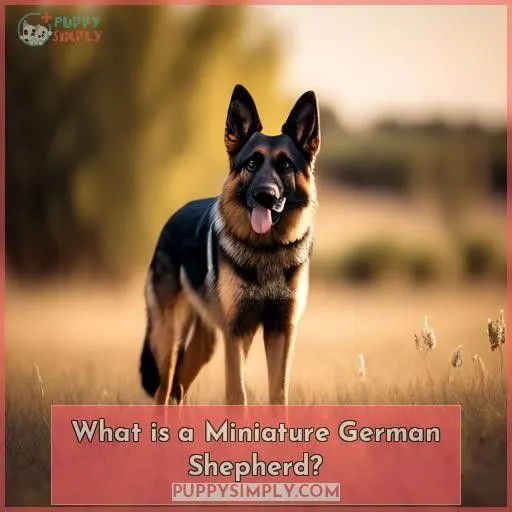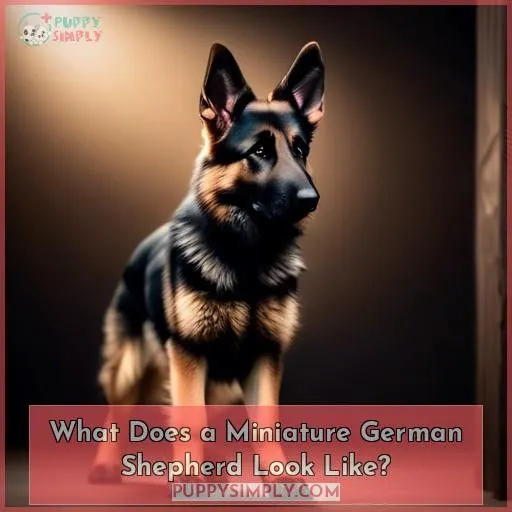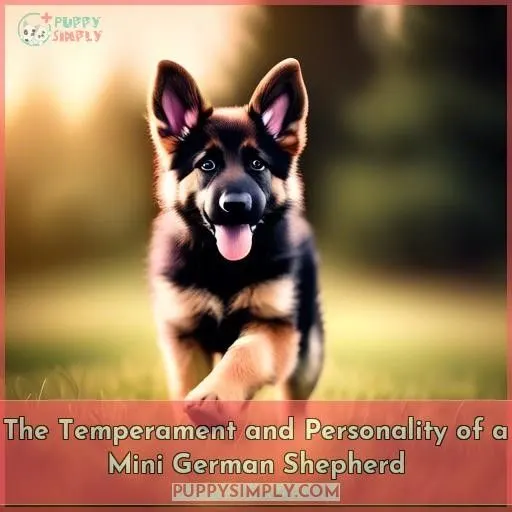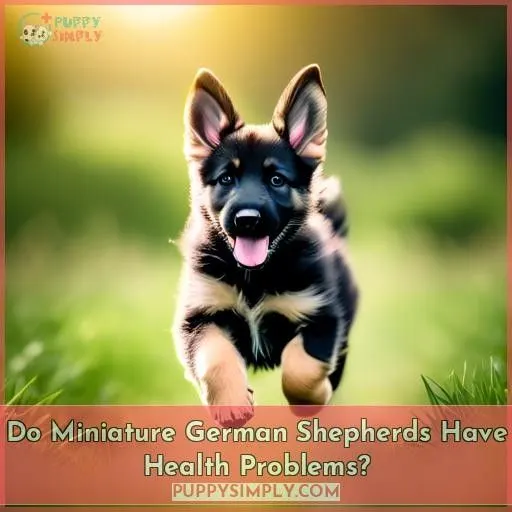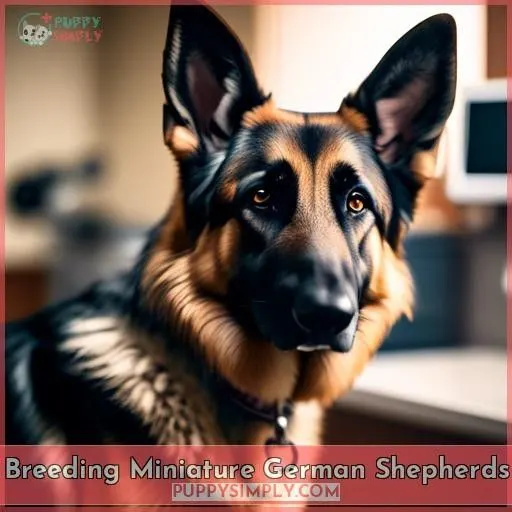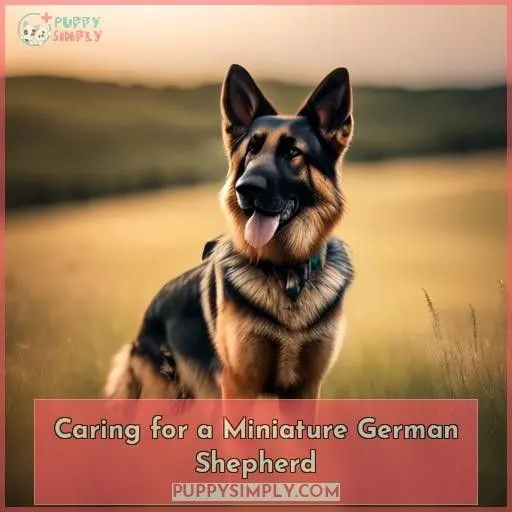This site is supported by our readers. We may earn a commission, at no cost to you, if you purchase through links.
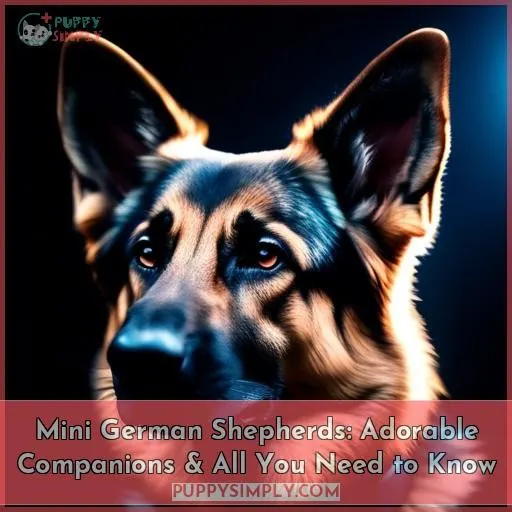 Miniature German Shepherds are adorable companions that pack the loyalty, intelligence, and energy of their larger counterparts into a compact size.
Miniature German Shepherds are adorable companions that pack the loyalty, intelligence, and energy of their larger counterparts into a compact size.
You’ll find these hybrid dogs weighing 30-50 pounds and standing 15-20 inches tall, with coats ranging from black to tan.
Their blend of German Shepherd traits and smaller breeds makes them excellent family pets, support animals, and service dogs suitable for various living situations.
While spared from some purebred issues, you’ll need to watch for potential health concerns like hip dysplasia and bloat.
By learning about their breeding, temperament, and care requirements, you’ll discover why miniature German Shepherds have everything you could want in a furry friend.
Table Of Contents
- Key Takeaways
- What is a Miniature German Shepherd?
- What Does a Miniature German Shepherd Look Like?
- The Temperament and Personality of a Mini German Shepherd
- Tips for Finding & Buying a Miniature German Shepherd
- Do Miniature German Shepherds Have Health Problems?
- Breeding Miniature German Shepherds
- Caring for a Miniature German Shepherd
- Frequently Asked Questions (FAQs)
- What is the typical weight range of a Miniature German Shepherd?
- How does the temperament of a Miniature German Shepherd differ from a purebred German Shepherd?
- What are the common health issues that Miniature German Shepherds may face?
- How do you find a reputable breeder for a Miniature German Shepherd?
- What is the average lifespan of a Miniature German Shepherd?
- Conclusion
Key Takeaways
- Miniature German Shepherds are a hybrid breed, often resulting from crossbreeding a standard German Shepherd with a smaller dog breed, leading to a compact size of 30-50 pounds and 15-20 inches tall.
- These dogs inherit the intelligence, loyalty, and recognizable appearance of a German Shepherd, but their smaller size and unique blend of traits make them excellent for various living situations, including as family pets, emotional support animals, and service dogs.
- Potential health concerns for Miniature German Shepherds include hip and elbow dysplasia, bloat, hemophilia, perianal fistulas, and megaesophagus, necessitating careful consideration of a breeder’s health testing practices and securing a health guarantee.
- When considering acquiring a Miniature German Shepherd, it’s important to inquire about the parents and breed mix, expect to pay around $1,000, and consider adopting from a rescue or shelter as an alternative to purchasing from a breeder.
What is a Miniature German Shepherd?
A Miniature German Shepherd isn’t your typical German Shepherd shrunk down to size; it’s a unique blend, born from crossbreeding with smaller dog breeds.
This process creates a pup that inherits the iconic traits of a German Shepherd – intelligence, loyalty, and that recognizable appearance – but in a more compact package.
The breed mix influences the size variations and appearance, making each Mini German Shepherd as unique as a fingerprint.
So, if you’re seeking the spirit of a German Shepherd without the full size, this pint-sized version might just steal your heart.
What Does a Miniature German Shepherd Look Like?
Miniature German Shepherds are a hybrid breed, typically a mix of a standard German Shepherd and a smaller breed, such as a Border Collie or Poodle.
They’re often smaller in size than their purebred counterparts, weighing between 30 and 50 pounds, and standing between 15 and 20 inches tall.
Their appearance can vary depending on the breed they were crossed with, but they often have a similar coat color range as standard German Shepherds, which includes black, brown, tan, and bi-color.
These dogs are intelligent, loyal, and energetic, making them suitable for various living situations, including families, couples, and singles.
The Temperament and Personality of a Mini German Shepherd
Mini German Shepherds are more than just diminutive versions of their larger counterparts.
They’re intelligent, loyal, and trainable companions that can make excellent family pets, emotional support animals, and even service dogs.
Their temperament is a blend of the German Shepherd’s loyalty and energy, making them well-suited for a variety of living situations.
If you’re contemplating a Mini German Shepherd, you’ll find everything you need to know about their personality, training potential, and more in this thorough guide.
Tips for Finding & Buying a Miniature German Shepherd
When searching for a Miniature German Shepherd, there are several key factors to ponder to guarantee you find a healthy, well-bred pup. Here are three tips to help guide your search:
- Inquire about the parents, breed mix, health, and breeder practices: It’s vital to learn the background of the parents and the specific breeds used in the crossbreeding process. Additionally, inquire about the health history of the parents and the breeder’s practices to guarantee the puppy is healthy and well-cared for.
- Expect to pay around $1,000: The cost of a Miniature German Shepherd can vary depending on the breeder, location, and specific breed mix. However, a general range to anticipate is around $1,000. Bear in mind that this is an estimate, and prices may be higher or lower depending on the factors mentioned above.
- Consider adopting from a rescue or shelter: If you’re looking to give a home to a dog in need, many rescues and shelters have Miniature German Shepherds available for adoption. This option can be more cost-effective and provides a second chance for a dog in need.
Do Miniature German Shepherds Have Health Problems?
While miniature German shepherds may be spared from some health issues that purebred German shepherds face, they can still develop conditions like hip and elbow dysplasia, bloat, hemophilia, perianal fistulas, and megaesophagus. It’s vital to investigate a breeder’s health testing practices and to secure a health guarantee when acquiring a mini German shepherd puppy.
Hip & Elbow Dysplasia
You’ve been exploring the journey of locating and acquiring a Miniature German Shepherd.
It’s now time to delve into their health considerations.
A prevalent concern is hip and elbow dysplasia, impacting hip stability and elbow functionality.
Joint supplements can provide support.
However, it’s essential to consult a veterinarian for proper guidance and treatment.
If your Miniature German Shepherd displays joint discomfort, don’t dismiss it.
Seek professional assistance to safeguard their well-being.
Bloat (Gastric Dilatation-Volvulus)
Bloat, also known as gastric dilatation-volvulus, is a life-threatening emergency in dogs. Symptoms include restlessness, drooling, and a distended abdomen. Prevention involves feeding smaller meals, avoiding strenuous exercise after meals, and monitoring for signs of bloat. Treatment includes stabilizing the dog, passing a stomach tube, and surgery. Recovery may involve a special diet and regular check-ups.
Hemophilia
Hemophilia, a blood clotting disorder, can affect Miniature German Shepherds. Treatment includes clotting factor replacement therapy and managing symptoms. The prognosis varies, with some dogs living long, healthy lives. Genetics play a role, with affected dogs often inheriting the condition from their parents. Symptoms include excessive bleeding and bruising, while prevalence is relatively low in this breed.
Perianal Fistula
Perianal fistula can be a real pain in the tail for your Mini German Shepherd, but don’t fret! Understanding the causes, spotting the symptoms early, and knowing the treatment options can lead to a smoother recovery. Here’s the scoop:
- Perianal Fistula Causes: Often immune-mediated, sometimes a genetic lottery no one wants to win.
- Perianal Fistula Symptoms: Your pup might scoot more than usual, showing discomfort.
- Perianal Fistula Treatment: From immune-suppressing drugs to dietary changes, there’s a range of options.
- Perianal Fistula Surgery & Recovery: Sometimes necessary, but with proper care, your furry friend will be wagging again in no time.
Megaesophagus
Megaesophagus is a condition where the muscles of the esophagus don’t work properly, preventing food and water from moving into the stomach. This can lead to regurgitation, loss of appetite, weight loss, and aspiration pneumonia if the regurgitated food particles are inhaled into the lungs. In dogs, megaesophagus can be congenital or acquired, and it’s more common in certain breeds like Miniature Schnauzers, Wire Fox Terriers, Great Danes, German Shepherds, Labrador Retrievers, Newfoundlands, Irish Setters, and Greyhounds.
Symptoms of megaesophagus include regurgitation, refusing to eat, loss of appetite, sudden weight loss, exaggerated or frequent swallowing, coughing, sour or foul smelling breath, nasal discharge, poor growth, increased respiratory noises, extreme hunger, and excessive drooling. Diagnosis typically involves a thorough physical examination, palpation of the throat area, and imaging techniques like radiographs or barium swallows.
Treatment for megaesophagus often involves managing underlying conditions, such as surgery for foreign objects in the esophagus, hospitalization for aspiration pneumonia, and a change in feeding position to an upright or even vertical position during meals. In some cases, medication like sildenafil or Botox injections may be used to improve esophageal motility.
Recovery from megaesophagus can be challenging, and it’s essential to closely monitor dogs for signs of aspiration pneumonia, which can be life-threatening. Regular veterinary check-ups and adjustments to the dog’s diet and feeding position are critical for managing the condition.
Breeding Miniature German Shepherds
Breeding Miniature German Shepherds is an intriguing enterprise for those who admire the breed’s singular allure and nature. However, it’s imperative to grasp the procedure comprehensively to safeguard the puppies’ health and well-being. Here are some vital steps to contemplate:
- Pedigree and Crossbreeding: Establish the dog’s lineage and weigh crossbreeding with smaller dog breeds to create a Miniature German Shepherd. This can result in a wider spectrum of coat hues and physical attributes.
- Litter Sizes: Anticipate a litter size of 4-6 puppies, with the possibility of larger litters if the mother has a robust genetic line.
- Temperament and Genetics: The temperament and personality of the Miniature German Shepherd will be influenced by both the parents’ traits and the genetics of the breed. Guarantee that the parents have desirable temperaments and are free from health concerns.
- Breeding Practices: Breed the female 5-7 days after she commences bleeding, and breed every other day until she no longer tolerates it. Mark the calendar 63 days from the first and last breeding for the due date. Transition to puppy food 2-3 weeks after the initial breeding, and deworm the female with pyrantel pamoate 2 weeks before and after the puppies are born.
Caring for a Miniature German Shepherd
Having grasped Miniature German Shepherd breeding, it’s time to prioritize caring for your new companion. These adorable friends demand a balanced diet, regular grooming, and stimulating activities to flourish. This section will cover feeding, grooming, training, exercise, and routine care for your Miniature German Shepherd.
| Aspect of Care | Description |
|---|---|
| Feeding | Provide a balanced diet with high-quality dog food, adjusting portion sizes to suit your dog’s age and activity level. |
| Grooming | Brush regularly to prevent matting and tangles, and bathe when necessary. |
| Training | Teach basic obedience commands and socialize your dog to cultivate good behavior and a strong bond. |
| Exercise | Engage in daily walks and playtime to fulfill your dog’s physical and mental needs. |
| Routine | Establish a consistent routine for feeding, grooming, and exercise to foster a healthy and happy lifestyle. |
Frequently Asked Questions (FAQs)
What is the typical weight range of a Miniature German Shepherd?
You’ll be utterly amazed by these pint-sized powerhouses! Miniature German Shepherds pack a mighty punch, tipping the scales between a featherweight 15-30 lbs – the ultimate in compact canine companions.
How does the temperament of a Miniature German Shepherd differ from a purebred German Shepherd?
You’ll find Miniature German Shepherds are just as intelligent and loyal as their purebred counterparts, but with a zestier personality packed into that compact frame. Their smaller size makes them a tad feistier, so early training is key to channel that spunky energy.
What are the common health issues that Miniature German Shepherds may face?
Verily, these crossbred canines may inherit hip and elbow dysplasia, bloat, or bleeding disorders from their German Shepherd kin. Keep a watchful eye, for prevention is thy greatest ally ‘gainst such malaises.
How do you find a reputable breeder for a Miniature German Shepherd?
You’ll want to do your research by visiting reputable breeders, asking lots of questions about their breeding practices, the parents’ health histories, and meeting the puppies’ parents in person. A good breeder will happily provide all this info and more.
What is the average lifespan of a Miniature German Shepherd?
Like a finely-tuned sports car, the Miniature German Shepherd‘s lifespan accelerates to 12-15 years on average – a demonstration of their hardy resilience and your nurturing care. Buckle up for a loyal companion’s energetic journey.
Conclusion
Intrigued by the charming nature of miniature German Shepherds? You’d be wise to investigate further, as these compact canines truly have it all – the loyalty, intelligence, and energy of their larger counterparts, packaged into a loveable mini-me.
By understanding the breed’s origins, temperament, and potential health concerns, you’ll discover why the mini German Shepherd makes an excellent family pet, support animal, and service dog.
Embrace the joy of this versatile, affectionate mini-me furry friend.

